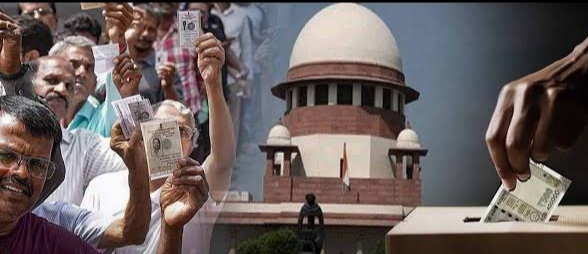
NEW DELHI: The Supreme Court on Thursday scrapped a seven year-old election funding system that allows individuals and companies to donate money to political parties anonymously and without any limits, ahead of the Lok Sabha elections in April-May.
The decision is seen as a setback for Prime Minister Narendra Modi’s Bharatiya Janata Party, which has been the largest beneficiary of the system it introduced in 2017.
The system, called ‘Electoral Bonds,’ was challenged by opposition members and a civil society group on grounds that it hindered the public’s right to know who had given money to political parties.
The government said donors had a right to privacy.
Under the system, a person or company can buy these bonds from the state-run State Bank of India and donate them to a political party of their choice.
A five-judge bench headed by Chief Justice D.Y. Chandrachud said that the system is “unconstitutional.” It said the electoral bonds violate the right to information and freedom of speech and expression under the Consstitution.
The court directed SBI to not issue any more of these bonds.
The bench was ruling on a batch of pleas challenging the legal validity of the Central government’s electoral bonds scheme At the beginning of the judgment, Chief Justice of Indian DY Chandrachud said there are two opinions, one by himself and another by Justice Sanjiv Khanna and both arrive at the same conclusion.
A five-judge Constitution bench delivered two separate and unanimous verdicts on the pleas challenging the electoral bonds scheme, delivering a major blow to the central government.
Pronouncing the verdict, CJI Chandrachud said the electoral bonds scheme is violative of freedom of speech and expression under Article 19(1)(a) of the Constitution.
The Supreme Court said infringement to the Right to Information is not justified to curb black money.
The top court bench said the fundamental right to privacy also includes citizens’ right to political privacy and affiliation.
The bench also held as invalid the amendments made in various laws, including the Representation of Peoples Act and the Income Tax laws.
The Supreme Court ordered the State Bank of India or SBI to disclose to the Election Commission the names of the contributors to the six-year-old scheme.
The bench directed that the issuing bank shall stop issuance of electoral bonds and the SBI shall submit details of electoral bonds purchased since April 12, 2019, till date to the Election Commission of India.
The Supreme Court said information about corporate contributors through electoral bonds must be disclosed as the donations by companies are purely for quid pro quo purposes.
The court held that amendments in the Companies Act permitting unlimited political contributions by companies are arbitrary and unconstitutional.
The electoral bonds scheme, which was notified by the government on January 2, 2018, was pitched as an alternative to cash donations made to political parties as part of efforts to bring transparency in political funding.
The bench, also comprising Justices Sanjiv Khanna, B R Gavai, J B Pardiwala and Manoj Misra, said, “The deletion of the proviso to Section 182(1) of the Companies Act, permitting unlimited corporate funding to political parties is arbitrary and violative of Article 14”.
Giving reasons, it said that the “ability of a company to influence the electrical process through political contribution is much higher when compared to that of an individual”.
“A company has a much graver influence on the political process, both in terms of the quantum of money contributed to political parties and the purpose of making such contributions. Contributions made by individuals have a degree of support or affiliation to a political association. However, contributions made by companies are purely business transactions made with the intent of securing benefits in return. The amendment to Section 182 is manifestly arbitrary for treating political contributions by companies and individuals alike”.
The apex court said, “Companies before the amendment to Section 182 could only contribute a certain percentage of the net aggregate profits. The provision classified between loss-making companies and profit-making companies for the purpose of political contribution and for good reason.. the underlying principle of this distinction was that it is more plausible that law-making companies will contribute to political parties with a quid pro and not for the purpose of income tax benefits”.
“The provision as amended by the Finance Act of 2017 does not recognise that the harm of contributions by loss-making companies in the form of quid pro quo is much higher. Thus the amendment…is manifestly arbitrary for not making a distinction between profit-making and loss-making companies for the purposes of political contribution”.
The court pointed out, “The purpose of Section 182 is to curb corruption and electoral financing. For instance, the purpose of banning a government company from contributing is to prevent such companies from entering the political fray by making contributions to political parties. Amendment to Section 182 by permitting unlimited corporate contributions authorises unrestrained influence of companies in the electoral process. This is violative of the principle of free and fair elections and political equality captured in the value of one person, one vote.”
The court asked ECI to publish the information shared by the SBI on its official website within one week of receiving the information, that is by March 13, 2024.
The Congress on Thursday welcomed the Supreme Court verdict striking down the electoral bond scheme and said it will reinforce the power of votes over notes.
In a post on X, its general secretary (communications) Jairam Ramesh said: “The Supreme Court has held the much touted Electoral Bonds scheme of the Modi sarkar as violative of both laws passed by Parliament as well as the Constitution of India.
The long-awaited verdict is hugely welcome and will reinforce the power of votes over notes, he said.
###





